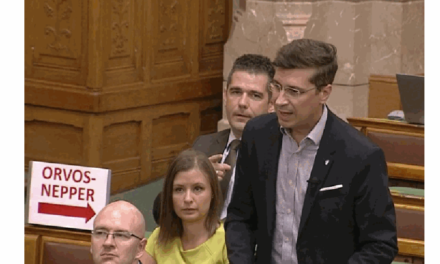The European Commission is filing a lawsuit against Hungary because of the law on the protection of sovereignty. According to the committee, the adopted law is in conflict with the legislative norms of the European Union. According to constitutional lawyer Zoltán Lomnici Jr., stricter rules for the protection of sovereignty are in force in the USA, so when Brussels attacks the Hungarian law, it is actually criticizing the American regulations as well.
The Sovereignty Protection Office was established on the basis of the Sovereignty Protection Act, whose main tasks include the investigation of specific activities that are carried out in the interest of other states or foreign organizations and that are likely to violate or even threaten the sovereignty of Hungary. The investigations also cover organizations operating in Hungary receiving foreign support, whose activities may even influence the outcome of democratic elections.
The Law on the Protection of Sovereignty complies with EU standards and is only being attacked for political reasons, junior constitutional lawyer Zoltán Lomnici said when asked by Magyar Nemzet
LXXXVIII of 2023 on the protection of national sovereignty. Law (Szvtv.), as well as the right to exist and the necessity of the Sovereignty Protection Office (Office) are also declared by Article (4) of the Basic Law of Hungary (Basic Law), according to which the protection of Hungary's constitutional identity and Christian culture is the duty of all organs of the state. It operates as an independent body created by a landmark law in order to protect constitutional identity.
- added the expert.
The Basic Law states that protecting our identity rooted in our historical constitution is a fundamental duty of the state. The adoption of the Sovereignty Protection Act was therefore another important step in an organic legislative process, he pointed out. - The justification of the law shows that - according to the experience of the recent period - the financial resources were clearly used by the foreign principals in order to gain political influence and to influence the will of the Hungarian voters, which not only exhausts the concept of political corruption, but also the sovereignty of Hungary offends, endangers - said the constitutional lawyer. He added:
"This serious danger includes the direct and indirect financial support and economic coercion of political actors, as well as the subversion of the functioning of civil society, the influential activities of NGOs operating on international and supranational principles, as Hungary and the Hungarian government have already stated in recent years recognized."
According to Zoltán Lomnici Jr., it is becoming more and more common for a given party to receive significant foreign support not directly, but for example through non-governmental organizations, which can be identified as clear intervention, which is precisely why the law states in its preamble that although "Hungarian regulations currently prohibit the the acceptance of foreign support for parties", it is also necessary to tighten the current regulations in order to prevent similar cases.
Regulation 2018/673 of the European Parliament and the Council of Europe (EU, Euratom) stipulates the importance of the principle of transparency on two points. The Svt. Paragraph (3) of § 6 stipulates that the national sovereignty report must be made public by June 30 of each year. This ensures transparency and access to information. This is in line with Article 42 of the EU Charter of Fundamental Rights, which guarantees the right of access to documents.
Claims that can be factually refuted
The law can be applied to anyone. The Parliament created the legislation in order to act against attempts to intervene against the sovereignty of Hungary, so the law is only applied in relation to acts that threaten the sovereignty and their perpetrators. The law defines exactly who the perpetrator of the above crime can be - as can be expected from the disposition of a criminal law norm within the framework of the rule of law, explained the constitutional lawyer.
"In addition, the preamble of the law precisely defines the role and purpose of the legislation and of the Office responsible for examining its enforcement."
- emphasized the expert.
Similarities between Hungarian and American regulations
Zoltán Lomnici Jr. also pointed out that the purpose of the sovereignty protection regulations is to help protect the country from external attack, i.e. from harmful external influence, but at the same time, the Constitutional Protection Office does not have secret service powers, so it cannot, for example, conduct wiretapping, unlike the specific international money laundering and with the American "Patriot Act" federal law to prevent, detect and prosecute the financing of terrorism.
"The USA Patriot Act (PA) amends the Foreign Intelligence Surveillance Act to authorize intelligence agencies to access certain business records, foreign intelligence investigations, and to allow the government to monitor foreign persons for reasons of national security"
explained Zoltán Lomnici. The PA and the PAA primarily provide protection against terrorism, while the Hungarian Sovereignty Protection Act (Szvtv.) protects Hungary's democratic processes and political system against foreign interference, he added.
"Taking into account the legal differences, however, we can say that stricter rules for the protection of sovereignty are in force in the USA, so when Brussels - driven by strong political motivation - attacks the Hungarian Szvtv., it is actually formulating a serious criticism of the American regulations."
- pointed out Zoltán Lomnici, junior, who also spoke about the fact that the law on the protection of sovereignty was partly drawn up based on international legal practice.
"In France, the High Authority for the Transparency of Public Life (Haute Autorité pour la transparence de la vie publique) was established in 2013, whose tasks and powers have been expanded, so in 2016, the Sapin-II. through the package of transparency laws, the French authorities are already supposed to reduce the exercise of economic pressure, lobbying and the serious risks of corruption"
- concluded the constitutional lawyer.
Cover image: Illustration / Pixabay













